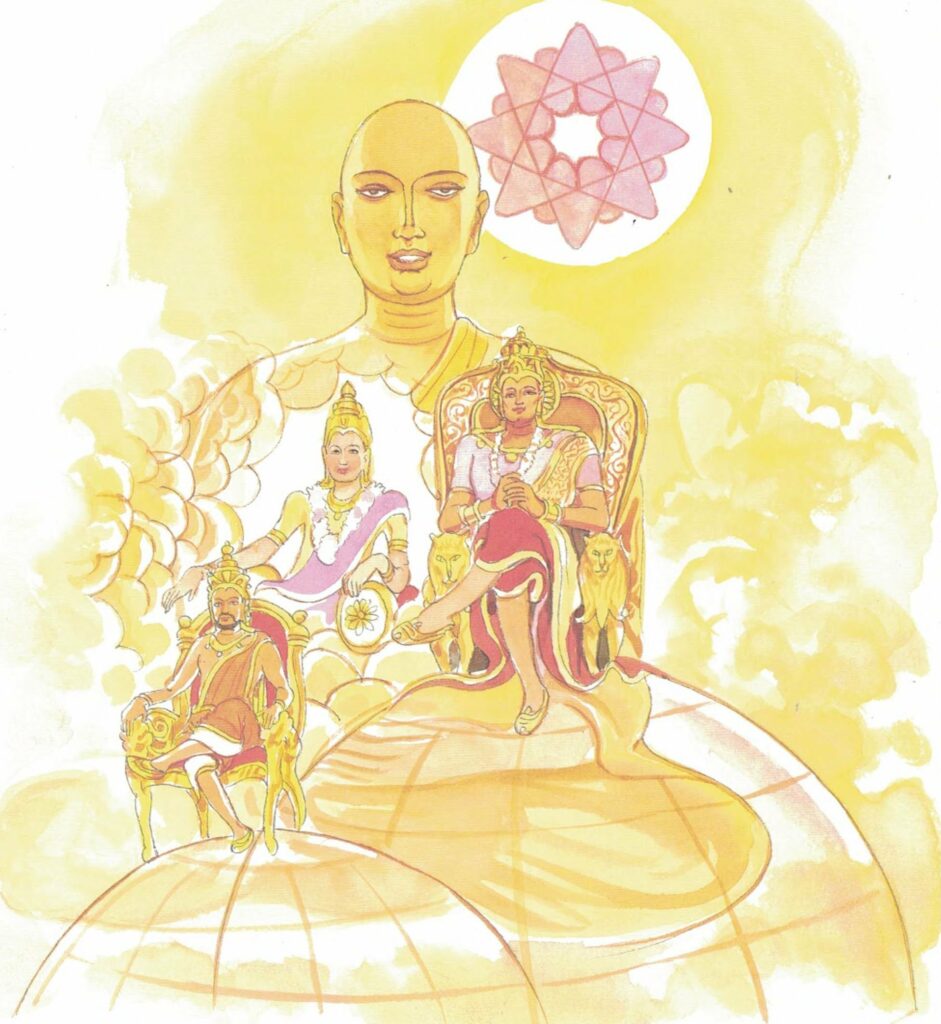Pali text, illustration and English translation of Dhammapada verse 178:
pathavyā ekarajjena saggassa gamanena vā |
sabbalokādhipaccena sotāpattiphalaṃ varaṃ || 178 ||
178. Than o’er the earth sole sovereignty, than going unto heaven, than lordship over all the worlds: better the Stream-winner’s Fruit.

The Story of Kāla, son of Anāthapiṇḍika
While residing at the Jetavana Monastery, the Buddha spoke this verse, with reference to Kāla, son of Anāthapiṇḍika, the well-renowned rich man of Sāvatthi.
Kāla, son of Anāthapiṇḍika, always kept away whenever the Buddha and his company of monks came to their house. Anāthapiṇḍika was afraid that if his son kept on behaving in this way, he would be reborn in one of the lower worlds (apāyas). So, he enticed his son with the promise of money. He promised to give one hundred if the youth consented to go to the monastery and keep sabbath for one day. So, the youth went to the monastery and returned home early the next day, without listening to any religious discourses. His father offered him rice gruel, but instead of taking his food, he first demanded to have the money.
The next day, the father said to his son, “My son, if you learn a stanza of the text from the Buddha, I will give you one thousand on your return.” So, Kāla went to the monastery again, and told the Buddha that he wanted to learn something. The Buddha gave him a short stanza to learn by heart: at the same time he willed that the youth would not be able to memorize it. Thus, the youth had to repeat a single stanza many times, but because he had to repeat it so many times, in the end, he came to perceive the full meaning of the Dhamma and attained sotāpatti fruition.
Early next morning, he followed the Buddha and the monks to his own house. But on that day, he was silently wishing, “I wish my father would not give me the one thousand in the presence of the Buddha. I do not wish the Buddha to know that I kept the sabbath just for the sake of money.” His father offered rice gruel to the Buddha and the monks, and also to him. Then, his father brought one thousand, and told Kāla to take the money but surprisingly he refused. His father pressed him to take it, but he still refused.
Then, Anāthapiṇḍika said to the Buddha, “Venerable, the demeanor of my son today pleases me.” “How is that, great treasurer?” “Day before yesterday I sent him to the monastery, saying to him, ‘I will give you a hundred pieces of gold.’ Yesterday he refused to eat because I did not give him the money: but today, when I give him the money, he refuses to touch it.” The Buddha replied, “It is even so, great treasurer. Today, in attaining the fruit of conversion, your son has attained that which surpasses the attainment of a universal monarch, the attainment of the world of the deities, the attainment of the world of Brahma.”
Explanatory Translation (Verse 178)
pathavyā ekarajjena, saggassa gamanena vā,
sabbalokādhipaccena, sotāpattiphalaṃ varaṃ
pathavyā: of the whole earth; ekarajjena: being the one king; saggassa: to the heavenly realms; gamanena vā: going along; sabbalokādhipaccena: being universal king; sotāpattiphalaṃ [sotāpattiphala]: the fruit of stream-winning;varaṃ [vara]: greater (than all those)
The achievement of the fruit of stream-winning is the primary stage in the attainment of spiritual success. That state is greater than being a universal monarch, or reaching heaven.
Commentary and exegetical material (Verse 178)
pathavyā ekarajjena: being sole ruler over earth. In terms of traditional lore, in certain ages, a universal king appears. He holds sway over the whole earth. That status is considered the greatest and the most supreme on earth. Tradition has it that only an individual capable of enjoying the fruit of all the meritorious activities he has accumulated, all at once, will achieve this unparalleled supreme status. According to this lore, his appearance on Earth will be foretold by bands of gods, a century before his arising. He comes into the possession of seven great treasures. These universal kings symbolize the highest possible material and worldly luxury. The tradition states that no two of them will appear in the world at one and the same time. A Buddha will not appear when a universal king reigns, nor will a universal king arise when a Buddha has appeared on earth.
sotāpatti: Here Sotā means the stream that leads to Nibbāna. It is the noble Eightfold Path. ‘Ā’ means for the first time. ‘Patti’ means attainment. Sotāpatti means the attainment of the stream for the first time. It is the realization of Nibbāna for the first time. This is the first stage of Sainthood. The Stream-Winners are not born in woeful states, but the worldly great are not exempt from them.